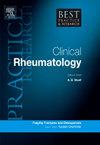How to treat monogenic SLE?
IF 4.8
2区 医学
Q1 RHEUMATOLOGY
Best Practice & Research in Clinical Rheumatology
Pub Date : 2024-09-01
DOI:10.1016/j.berh.2024.101962
引用次数: 0
Abstract
Systemic lupus erythematosus is a rare and life-threatening autoimmune disease characterized by autoantibodies against double-stranded DNA, with an immunopathology that remains partially unclear. New insights into the disease have been provided by the discovery of key mutations leading to the development of monogenic SLE, occurring in the context of early-onset disease, syndromic lupus, or familial clustering. The increased frequency of discovering these mutations in recent years, thanks to the advent of genetic screening, has greatly enhanced our understanding of the immunopathogenesis of SLE. These monogenic defects include defective clearance of apoptotic bodies, abnormalities in nucleic acid sensing, activation of the type-I interferon pathway, and the breakdown of tolerance through B or T cell activation or lymphocyte proliferation due to anomalies in TLR signalling and/or NFκB pathway overactivation. The translation of genetic discoveries into therapeutic strategies is presented here, within the framework of personalized therapy.
如何治疗单基因系统性红斑狼疮?
系统性红斑狼疮是一种罕见的危及生命的自身免疫性疾病,其特征是针对双链DNA的自身抗体,其免疫病理仍部分不清楚。通过发现导致单基因系统性红斑狼疮发病的关键突变,人们对这种疾病有了新的认识,这些突变发生在早发性疾病、综合征性狼疮或家族聚集性疾病中。近年来,由于基因筛查技术的出现,发现这些突变的频率越来越高,这大大提高了我们对系统性红斑狼疮免疫发病机制的认识。这些单基因缺陷包括凋亡体清除缺陷、核酸感应异常、I型干扰素通路激活,以及由于TLR信号异常和/或NFκB通路过度激活导致的B或T细胞激活或淋巴细胞增殖,从而破坏耐受性。本文介绍了在个性化治疗框架内将基因发现转化为治疗策略的情况。
本文章由计算机程序翻译,如有差异,请以英文原文为准。
求助全文
约1分钟内获得全文
求助全文
来源期刊
CiteScore
9.40
自引率
0.00%
发文量
43
审稿时长
27 days
期刊介绍:
Evidence-based updates of best clinical practice across the spectrum of musculoskeletal conditions.
Best Practice & Research: Clinical Rheumatology keeps the clinician or trainee informed of the latest developments and current recommended practice in the rapidly advancing fields of musculoskeletal conditions and science.
The series provides a continuous update of current clinical practice. It is a topical serial publication that covers the spectrum of musculoskeletal conditions in a 4-year cycle. Each topic-based issue contains around 200 pages of practical, evidence-based review articles, which integrate the results from the latest original research with current clinical practice and thinking to provide a continuous update.
Each issue follows a problem-orientated approach that focuses on the key questions to be addressed, clearly defining what is known and not known. The review articles seek to address the clinical issues of diagnosis, treatment and patient management. Management is described in practical terms so that it can be applied to the individual patient. The serial is aimed at the physician in both practice and training.

 求助内容:
求助内容: 应助结果提醒方式:
应助结果提醒方式:


